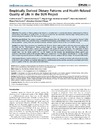Identificador persistente para citar o vincular este elemento:
https://accedacris.ulpgc.es/jspui/handle/10553/21148
| Título: | Empirically derived dietary patterns and health-related quality of life in the SUN Project | Autores/as: | Ruano-Rodríguez, Cristina Henríquez Sánchez, Patricia Martínez-González, Miguel Ángel Bes-Rastrollo, Maira Ruiz-Canela, Miguel Sánchez-Villegas, Almudena |
Clasificación UNESCO: | 3206 Ciencias de la nutrición | Palabras clave: | Quality of life Dietary patterns |
Fecha de publicación: | 2013 | Publicación seriada: | PLoS ONE | Resumen: | Objective: The analysis of dietary patterns has become a valuable tool to examine diet-disease relationships but little is known about their effects on quality of life. Our aim was to ascertain the association between major dietary patterns and mental and physical quality of life after 4 years of follow-up.Materials and Methods: This analysis included 11,128 participants from the "Seguimiento Universidad de Navarra'' (SUN) cohort. Dietary habits were assessed using a validated food-frequency questionnaire. Factor analysis was used to derive dietary patterns. Quality of life was measured with the validated Spanish version of the SF-36 Health Survey.Results: Two major dietary patterns were identified, the 'Western' dietary pattern (rich in red meats, processed pastries and fast-food) and the "Mediterranean'' dietary pattern (high in fruits, vegetables and olive oil). After controlling for confounders, the Western dietary pattern was associated with quality of life in all domains. The magnitude of these differences between the subjects in the highest (quintile 5) and the lowest quintile of adherence to the Western pattern ranged from 20.8 (for mental health) to 23.5 (for vitality). On the contrary, the Mediterranean dietary pattern was associated with better quality of life domains: differences ranged from + 1.3 (for physical functioning) to + 3.4 (for vitality) when comparing extreme quintiles of adherence. Additional sensitivity analyses did not change the reported differences.Conclusions: Whereas baseline adherence to a Western dietary pattern was inversely associated with self-perceived quality of life after 4 years of follow-up, baseline adherence to a Mediterranean dietary pattern was directly associated with better scores in quality of life four years later in the SUN Project. | URI: | https://accedacris.ulpgc.es/handle/10553/21148 | ISSN: | 1932-6203 | DOI: | 10.1371/journal.pone.0061490 | Fuente: | PLoS ONE [ISSN 1932-6203], v. 8 (5) : e61490 | Derechos: | by-nc-nd |
| Colección: | Artículos |
Citas SCOPUSTM
44
actualizado el 08-jun-2025
Citas de WEB OF SCIENCETM
Citations
42
actualizado el 15-feb-2026
Visitas
113
actualizado el 23-ene-2024
Descargas
115
actualizado el 23-ene-2024
Google ScholarTM
Verifica
Altmetric
Comparte
Exporta metadatos
Los elementos en ULPGC accedaCRIS están protegidos por derechos de autor con todos los derechos reservados, a menos que se indique lo contrario.
